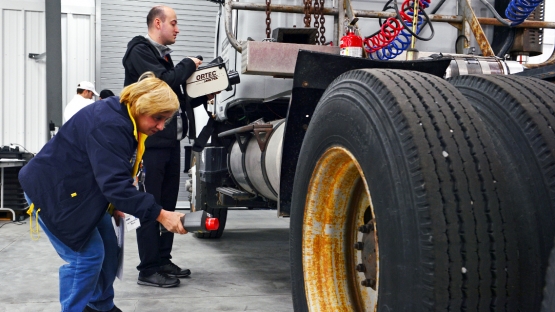The entry into force of the Amendment to the Convention on the Physical Protection of Nuclear Material (CPPNM) is vitally important to the global nuclear security framework. This was the core message the IAEA and its partners delivered to participants of a workshop on facilitating adherence to and implementation of the CPPNM Amendment in Obninsk, Russia, earlier this month. The Amendment, negotiated in 2005, has 84 Contracting States to date. Adherence by an additional 17 States is still required for it to enter into force.
"The adoption of the Amendment to the CPPNM can be the single most important step which the international community can take in strengthening nuclear security globally," IAEA Director General Yukiya Amano said in a video message to the workshop participants.
The workshop, organized by the IAEA and supported by the Russian Federation, was held at the Global Nuclear Security and Safety Institute (GNSSI). Representatives from Azerbaijan, Belarus, Kyrgyzstan and Mongolia, which have not ratified the amendment to date, participated in the workshop, along with officials from Tajikistan, which ratified it last year. Experts from Armenia, Moldova, Russia shared their national experiences in adhering to the Amendment, while the IAEA briefed participants on how the Amendment can contribute to strengthening nuclear security.
Vladimir Ostropikov of the Russian State Atomic Energy Corporation (Rosatom) told participants that the nuclear security framework needs to keep up with changing times. "A lot has already been done to strengthen the international regime of nuclear security," he said. "However, in response to new potential threats, nuclear security has continuously to improve: mainly the physical protection of nuclear material and facilities and the international regime as a whole."
Amendment to Broaden the Scope of the Convention
The original Convention entered into force in 1987 and is the only legally binding international instrument in the area of physical protection of nuclear material. It is one of the 18 international counter-terrorism instruments, with a focus on the physical protection of nuclear material used for peaceful purposes while it is in international transport. The Convention does not cover the physical protection of nuclear material in peaceful domestic use, storage and transport or that of nuclear facilities.
In 2005, the Parties to the Convention adopted an Amendment to the Convention that broadens its scope. The Amendment makes it legally binding for Parties to protect nuclear facilities used for peaceful purposes and nuclear material in peaceful domestic use, storage and transport. It also provides for expanded cooperation among States on rapid measures to locate and recover stolen or smuggled nuclear material, to mitigate any radiological consequences of sabotage, and to prevent and combat related offences.
The IAEA General Conference has encouraged all IAEA Member States that have not yet done so to become party to the CPPNM, and has called upon all Parties to the CPPNM to adhere to the Amendment as soon as possible.
At the closing session, participants agreed that the workshop was very informative and served as a strong motivation for them to encourage their Governments to ratify the Amendment, according to Karin Burmester, an IAEA senior nuclear security officer coordinating the workshop. "They also welcomed the offer of IAEA assistance and support for the ratification process; and communication along this line will be addressed to the Agency in due course by a few delegations," she said.
In response to new potential threats, nuclear security has continuously to improve.


